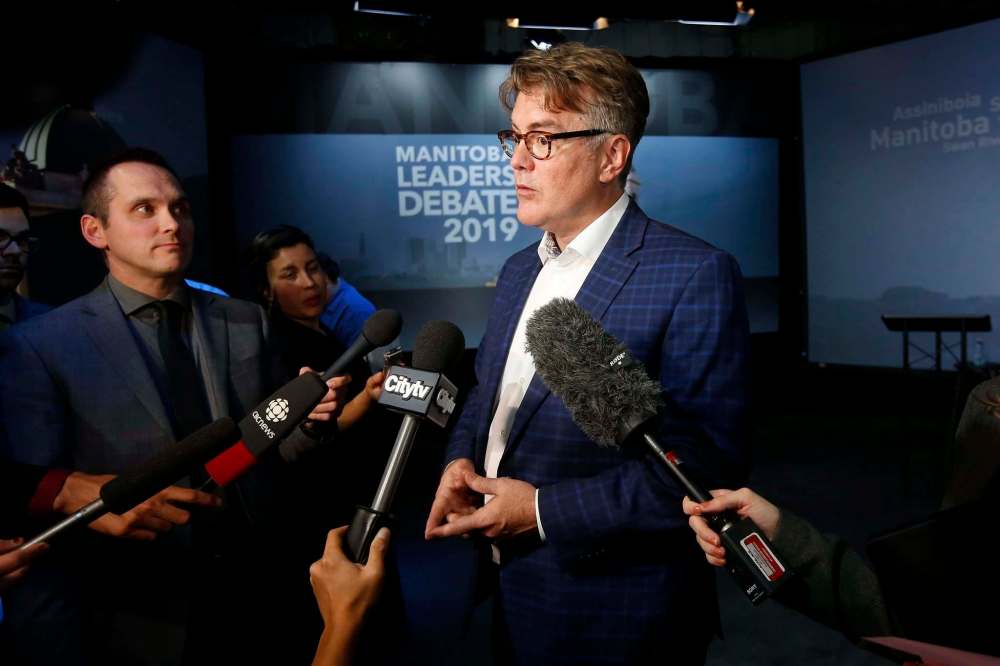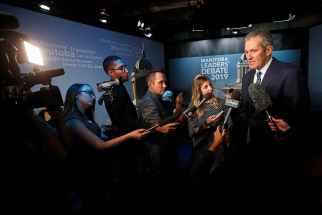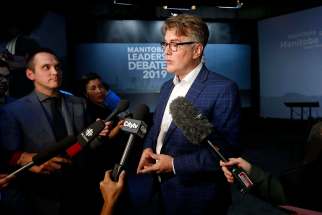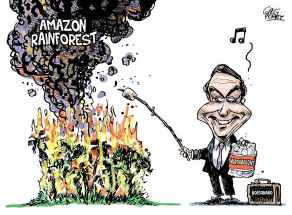Election debate blueprint needs update
Read this article for free:
or
Already have an account? Log in here »
To continue reading, please subscribe:
Monthly Digital Subscription
$1 per week for 24 weeks*
- Enjoy unlimited reading on winnipegfreepress.com
- Read the E-Edition, our digital replica newspaper
- Access News Break, our award-winning app
- Play interactive puzzles
*Billed as $4.00 plus GST every four weeks. After 24 weeks, price increases to the regular rate of $19.95 plus GST every four weeks. Offer available to new and qualified returning subscribers only. Cancel any time.
Monthly Digital Subscription
$4.99/week*
- Enjoy unlimited reading on winnipegfreepress.com
- Read the E-Edition, our digital replica newspaper
- Access News Break, our award-winning app
- Play interactive puzzles
*Billed as $19.95 plus GST every four weeks. Cancel any time.
To continue reading, please subscribe:
Add Free Press access to your Brandon Sun subscription for only an additional
$1 for the first 4 weeks*
*Your next subscription payment will increase by $1.00 and you will be charged $16.99 plus GST for four weeks. After four weeks, your payment will increase to $23.99 plus GST every four weeks.
Read unlimited articles for free today:
or
Already have an account? Log in here »
Hey there, time traveller!
This article was published 29/08/2019 (2374 days ago), so information in it may no longer be current.
The leaders debate has been a pillar of electoral politics in this country for a very long time. And in case you hadn’t noticed, that pillar is decaying.
On Wednesday night, the leaders of Manitoba’s four main political parties gathered in a Winnipeg television studio for the 2019 provincial election campaign’s first face-to-face debate. There were two significant problems with this event.
First, the format — as has been the recent tradition, the three local television stations that hosted it limited the debate to just 50 minutes, beginning at approximately 6:10 p.m. It could have been a full hour, but each channel’s management apparently decided it was necessary to precede the debate with 10 minutes of general news — an approach that created an immediate time crunch for what followed. And the event was destined not to extend beyond its allotted time, presumably because democratic debate cannot compete with, or disrupt, a TV network’s lucrative prime-time lineup.

All the leaders suffered as a result of this format, but none moreso than Liberal Leader Dougald Lamont, whose closing remarks were interrupted in mid-sentence to allow the channels to cut to the aforementioned prime-time programming. The moment will linger as a stain on Manitoba electoral history.
The second problem, which amplifies the first, is that this could very well be the only debate of its kind in this campaign.
Having only one leaders’ debate, particularly one that adheres to such an abridged format, does not adequately serve to inform or engage voters in this general election.
Progressive Conservative Leader Brian Pallister has already eliminated a debate in Brandon — a long-standing tradition in Manitoba politics — by refusing to attend. There are concerns he may do the same thing with the Winnipeg Chamber of Commerce’s debate, which is scheduled for Sept. 6. Mr. Pallister has, to date, declined to confirm his attendance.
Having only one leaders debate, particularly one that adheres to such an abridged format, does not adequately serve to inform or engage voters in this general election.
Informing and engaging are the core goals of any leaders debate, and the one we saw this week — perhaps the only one of this campaign — failed on both counts.
Manitoba needs reform in the area of political debates, similar to what was undertaken at the federal level in 2018.
An arm’s-length commission should be created to set the number, format and participant eligibility for debates. Parties wishing to be listed on the ballot in any election would be compelled to participate in a set number of debates, in any format deemed appropriate by the independent oversight body.
Such a commission could stop incumbent governing parties from holding a de facto veto on debates; it would also prevent leading parties from joining forces to stop a third- or fourth-party alternative from participating.
Such a commission could stop incumbent governing parties from holding a de facto veto on debates; it would also prevent leading parties from joining forces to stop a third- or fourth-party alternative from participating. In other words, it would depoliticize a device intended to contribute to making a more informed, more engaged electorate.
An independent provincial debate commission could also change the rules of engagement for TV networks. If broadcasters wish to earn the right to host a leaders debate, they would have to dedicate sufficient time to make the event worthwhile for voters and for politicians. If conventional television cannot find a way to do that, networks should withdraw from consideration and let social media — which has the capacity to do live broadcasts — take over this important democratic function.
In an age of declining voter turnout, we can no longer afford to allow political parties or broadcast outlets to manipulate this important electoral apparatus for their own benefit. It’s time for a new approach ensuring the interests of voters are paramount when scheduling and arranging debates








